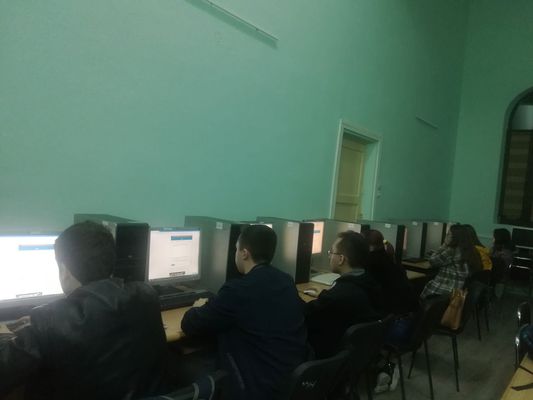In 3 international teams work on the basic vocabulary related to democracy and democratic culture:
TEAM 1 vocabulary from A - H
TEAM 2 vocabulary from I - N
TEAM 3 vocabulary from O - Z
This is the basic vocabulary related to democracy and democratic culture yu have created and translated into 3 more languages. Study it.
This is a list of vocabulary items related to democracy
Amendment - The process of formally altering or adding to a document or record, such as the constitution.
Anarchy Lack of any structure of political authority. It is a kind of political disorder and confusion.
Autocracy - This is a government by an individual with unrestricted authority.
Authoritarian - An authoritarian regime is one that is characterized by or favoring absolute obedience to authority, as against individual freedom.
Ballot - A ballot means either 1. the act, process, or method of voting, especially in secret or a sheet of paper or 2. a card used to cast or register a vote, especially a secret one. A ballot box is a box in which voters deposit their marked ballots.
Bureaucracy - An administrative system in which the need or inclination to follow rigid or complex procedures impedes effective action.
Campaign - Election campaign is a series of coordinated activities, such as public speaking and demonstrating, designed to achieve a social, political.
Candidate - A candidate is a person seeking or nominated for election to a position of authority such as president, prime minister, member of parliament...
Congress - The national legislative body of a nation, especially a republic. It is formal assembly of representatives. (See the entry about parliament)
Constitution - A constitution is a system of fundamental laws and principles that prescribes the nature, functions, and limits of a government.
Constitutional Monarchy - This is a monarchy in which the powers of the ruler are restricted to those granted under the constitution and laws of the nation.
Democracy - The term Democracy comes from the Greek words dêmos (people) and Kratos (power). In its literal meaning, democracy means the "rule of the people". In fact it is a form of government in which all eligible people have an equal say in the decisions that affect their lives. Democracy as a political systems existed in some Greek city-states, notably Athens following a popular uprising in 508 BC.
Dictatorship - A dictatorship refers to an autocratic form of government in which the government is ruled by an individual, the dictator.It is a form of government that has the power to govern without consent of those being governed.
Election - An election is a formal decision-making process by which a population chooses an individual to hold public office. Elections have been the usual mechanism by which modern representative democracy operates.
Government - Government is the means by which state policy is enforced, as well as the mechanism for determining the policy of the state.
Head of State - The chief public representative of a country who may also be the head of government.
Majority - The political party, group, or faction having the most power by virtue of its larger representation or electoral strength.
Minority - A group or party having fewer than a controlling number of votes.
Monarchy - A monarchy is a form of government in which the office of head of state (a king or a queen) is usually held until death or abdication and is often hereditary.
MP - MP stands for Member of Parliament. An MP is a representative of the voters to a parliament.
Oligarchy - It is a form of power structure in which power effectively rests with a small number of people. These people could be distinguished by royalty, wealth, family ties, corporate, or military control.
Opposition - The opposition comprises one or more political parties or other organized groups that are opposed to the government
Parliament - A parliament is a national representative body having supreme legislative powers within the state. (See the entry about congress)
Political Party - A political party is a political organization that typically seeks to influence government policy, usually by nominating their own candidates and trying to seat them in political office. Parties participate in electoral campaigns, educational outreach or protest actions.
President - Head of state in a presidential system.
Prime Minister - A prime minister is the most senior minister of cabinet in the executive branch of government in a parliamentary system.
Queen / King - a king, queen or a monarch is the person who heads a monarchy.
Regime - It is the form of government: the set of rules, cultural or social norms, etc. that regulate the operation of government and its interactions with society.
Republic - A political order whose head of state is not a monarch and in modern times is usually a president.
Separation of powers - Separation of powers is a model of governance under which the state is divided into branches, each with separate and independent powers and areas of responsibility so that no one branch has more power than the other branches. The normal division of branches is into an executive, a legislature, and a judiciary.
Executive branch of government is the part of government that has sole authority and responsibility for the daily administration of the state bureaucracy
A legislature is a kind of deliberative assembly such as a parliament or a congress with the power to pass, amend, and repeal laws.
The judiciary is the system of courts that interprets and applies the law in the name of the state.
Sovereignty - Sovereignty is the quality of having supreme, independent authority over a geographic area, such as a territory.
State - It is an organized political community, living under a government
Theocracy - Theocracy is a form of government in which a state is understood as governed by immediate divine guidance provided to ruling clergy or other ruling officials
Voting - Voting is a method for a group such as a meeting or an electorate to make a decision or express an opinion—often following discussions, debates, or election campaigns. It is often found in democracies and republics. The minimum age for voting in most countries is 18.
Task:
Fill in in the collaborative google docs English vocabulary related to your native language - either Slovak, Romanian, Italian:
Fill in here
ONLINE DICTIONARY RELATED DEMOCRACY - useful vocabulary for the eTwinning project _@mb@ss@dors of Europe@n Democr@tic Culture_ - Hárok1.pdf
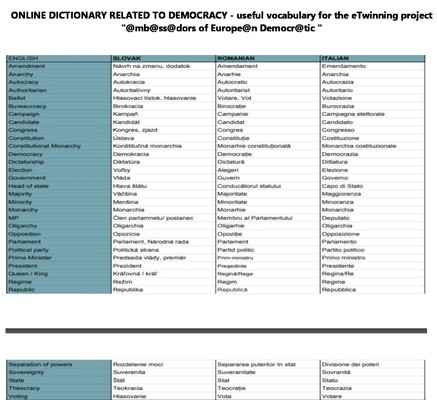
Discussing about democracy and creating the dictionary
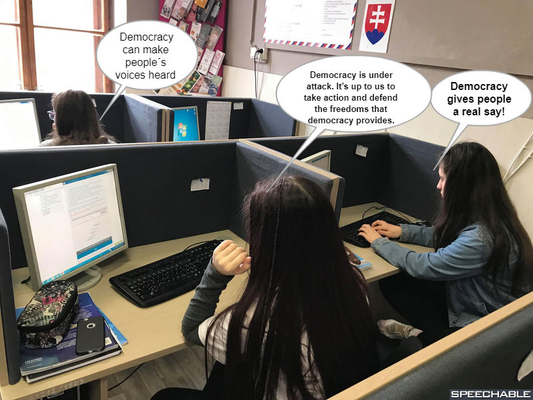
Working process on a democratic dictionary in Slovakia
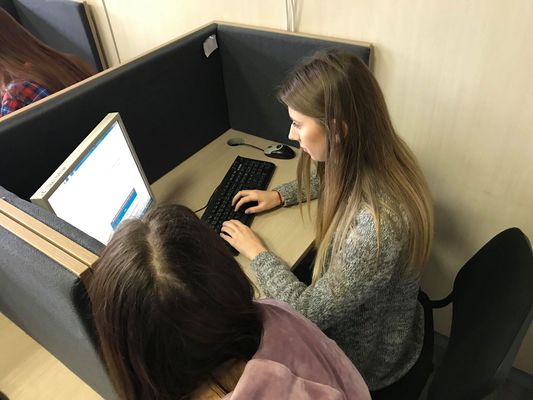
Working process on a democratic dictionary in Italy
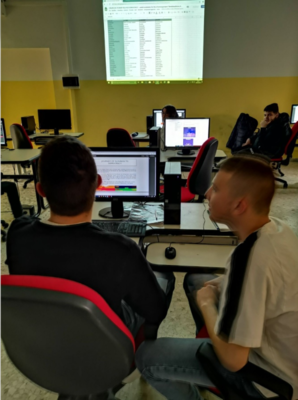
Working process on a democratic dictionary in Romania
